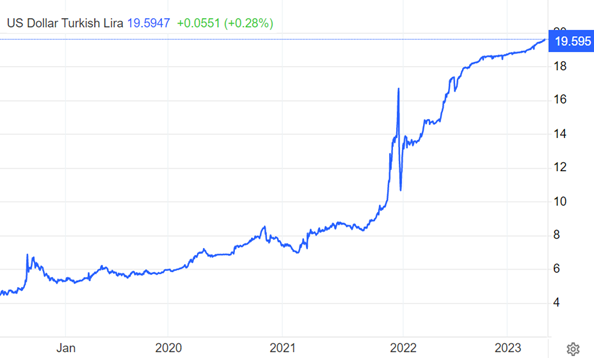Article on Reuters said that ahead of Turkey's presidential election this weekend, a small party candidate abruptly withdrew and a closely watched poll gave Erdogan's challenger a more than five percentage point advantage. Muharrem Ince's withdrawal, one of four candidates in the presidential race, could reshape the last days of campaigning in what is seen as Erdogan's biggest test in his two-decade reign. The survey by pollster Konda, carried out on May 6th to 7th, put support for Erdogan on 43.7% and his opponent Kemal Kilicdaroglu on 49.3%, suggesting the election would go to a run-off between the two men on 28th of May. Financial markets reacted positively to Ince's withdrawal, with Turkey's main stock index jumping 6% and the country's sovereign dollar bonds rallying, with longer-dated issues rising as much as 2.5 cents in the dollar to change hands at over 82 cents. The survey was carried out before Ince's announcement. Pretty shocking news for the country like Turkey. If the president Erdogan will lose the elections, I am expecting very volatile days for Turkish lyra.
Article on CNN also explained, what could happen if Erdogan loses. Based on analysts’ predictions, it could follow that there is a possibility that Erdogan may challenge the election results if he loses by a small margin. The AK Party has a history of rejecting results they disagree with, as seen in the 2019 Istanbul and Ankara mayoral election where they disputed the narrow victory of the opposition CHP party. The YSK, which oversees voting procedures and is appointed by AKP-dominated judicial bodies, may give in to demands for a recount. According to a 2023 report by Freedom House, the AK Party's institutional dominance in the media and other areas tilts the electoral playing field in Erdogan's favour.
On the other hand, Turkey is facing one of the biggest and scariest inflations in the history, and if that is not enough, country was hit by devastating earthquakes. Another shock, like changing the president, could really spin the value of Turkish lyra. However, to see if for the better or the worse, I will have to wait until Sunday, when the elections results of first round will be known. It will for sure be interesting few days for me as a trader.

*
* Past performance is no guarantee of future results.








